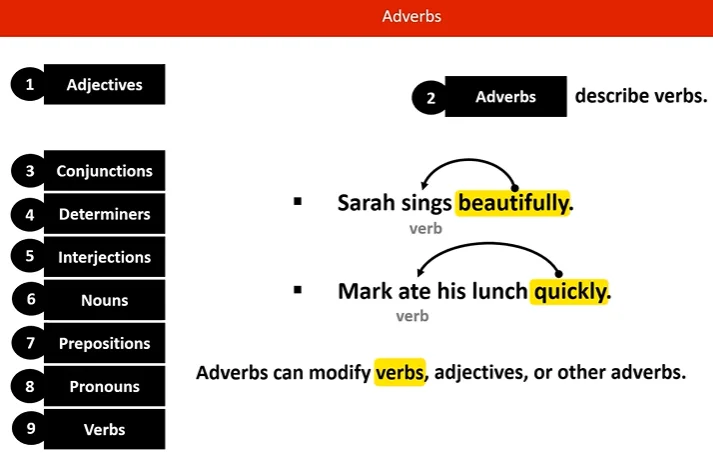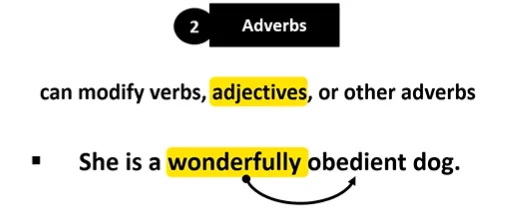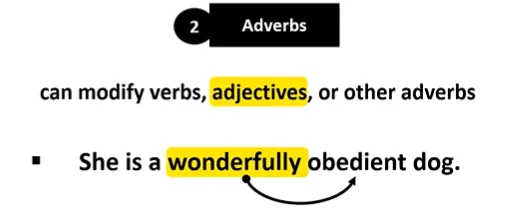Definition of Adverbs
Adverbs are the words that describe (modify) verbs, adjectives, and other adverbs, that are their main functions. It means an Adverb modifies the following three parts of speech:
- A verb (The cat jumps quickly.)
- An adjective (The cat takes a very quick jump.
- Another adverb (The cat jumps very quickly.)
Adverbs are one of the nine parts of speech given here in alphabetical order.
Examples of Adverbs describing verbs
- She is walking quickly.
- My car is running fast.
- I’m speaking loudly.
- Henna speaks English fluently.
- My cat drinks milk slowly.
- These parrots are flying highly.
- The farmer worked swiftly.
- The horse works hard.
- My mom speaks softly.
- I can easily drive this new car.
- You laugh cheerfully.
- The crow plays tricks with children cleverly.

Explanation
- Sarah sings beautifully. So, ‘sings’ is the =verb in this sentence, and ‘beautifully’ is the =adverb and it describes sings to tell us how Sarah sings.
- Mark is having lunch quickly. Well, ‘having’ is the verb, and ‘quickly’ is the =adverb. It describes having to tell us how Mark had his lunch.
- The dog sleeps peacefully. So, ‘peacefully’ is our adverb of manner and it modifies the verb =sleeps to tell us how the dog sleeps.
In these examples, you can see adverbs describe the manners of verbs. So, adverbs modify verbs and tell us how or in what manner an action takes place. These are called Adverbs of Manners. For example: fast, rudely, bravely, honestly, beautifully, neatly, sadly, happily, carefully, properly, quickly, safely, gently, fluently, patiently, merrily, heavily, openly, closely, well, etc.
Examples of Adverbs describing Adjectives
- My father made a highly effective plan.
- You took a truly good decision.
- She is walking highly slow.
- You have gently soft skin.
- He is a really unhappy man.
- You are a well-known person.
- TV has a very low volume.
- It is neatly white paper.
- You showed an extremely sharp performance.
- She is a fluently good speaker.

Explanation
- My father made a highly effective plan. In this sentence, the adverb=highly is describing the adjective= effective by modifying its quality. As we can question; how much the plan effective is, the answer is=highly effective.
- You take a wisely good decision. So, the adverb=wisely is describing the adjective= good by describing its quality. As we can ask; how the decision good is, the answer is=wisely good.
- She is walking very slow. In this sentence, the adverb=very is describing the adjective= slow by describing its quality. As we can ask; how much she walks slow, the answer is=very slow.
In the above examples, you can notice how adverbs describe (modify )the qualities of adjectives. So, adverbs give us more information about the quality of an adjective and answer us how much or in what manner a quality appears. This is the second function of Adverbs. For example, very fast car, bravely fearless man, honestly fair lady, highly effective plan, neatly pure page, really unhappy woman, happily handsome boy, properly managed work, quickly rash dog, safely conveyed luggage, gently soft skin, fluently speaking girl, patiently posing beggar, very low volume, openly revealed secret, well-known personality, extremely loud noise, etc.
Examples of Adverbs describing other Adverbs
- My friend is running after the thief so quickly.
- Your phone is ringing extremely loudly.
- The children are speaking very loudly.
- She is looking very highly fashionable.
- The team is playing very efficiently.
- They are rather never available.
- You can write really fast.
- You helped us so kindly.
- He fell so suddenly.
- I am lonely here.

Explanation
- The team is playing very efficiently. In this sentence, the adverb=very is describing another adverb=efficiently.
- You are rather never available. In this sentence, the adverb=rather is describing another adverb=never.
- My friend is running after the thief so fast. In this sentence, the adverb=so is describing another adverb=fast.
- Don’t speak extremely loudly. In this sentence, the adverb=extremely is describing another adverb=loudly.
This is the third function of Adverbs to describe (modify) other adverbs. For example, very nicely, so beautifully, very slowly, extremely loudly, very highly, so neatly, really unhappily, very happily, so rashly, very gently, rather well, etc.
Overview of Adverbs
The simplest sentences have just a subject and a verb. Verbs tell you the action. For example, what did Jane do? Jane sang but what if you want to know if Jane was a good singer? That’s when you use an adverb; Jane sang beautifully. Jane sang terribly. How well she sang, is important information conveyed only by the adverb. So, we say the adverb modifies the verb in these examples.
In this way an adverb adds more information usually about TIME: often, rarely, yesterday; MANNER: quickly, well, reluctantly; PLACE: here, there, and everywhere. Adverbs can occur before or after verbs whenever they modify them. For example, the dog loudly ate or the dog ate loudly. Usually, one way will sound better than the other but both are correct.
Adverbs can also be used to modify adjectives but in that case, they appear in front of the adjective. For example, Mr. Rochester is rather unpleasant. Here, unpleasant is an adjective and rather tells you a little bit more about how unpleasant he is. Is he extremely unpleasant? No. But he’s rather unpleasant.
Adverbs can even modify other adverbs. He thinks very highly of her. So, highly is an =adverb, it tells you what he thinks about her and how highly; very highly. Here, very is an =adverb that modifies highly =another adverb. Many adverbs end in =’ ly,’ especially the adverbs derived from adjectives; quick = quickly, clever = cleverly, gentle = gently. But there are lots of adverbs that don’t end in ‘ly’ like now, never, very, well, fast, and so on.
Difference between Adverbs and Adjectives
The way to identify an adverb is to see that it’s modifying a verb, adjective, and adverb. Don’t be alarmed if you find a word that can act like both an adverb and an adjective like:
- The fast horse jumped over the fence.
- The boy ran fast.
- You are hard-working.
- You work hard.
In the first sentence, ‘fast’ modifies the noun horse. So, it’s acting as an adjective but in the second sentence, ‘fast’ modifies the verb ran so it’s acting as an adverb. The same function is in the second sentence, it’s all about the context.

